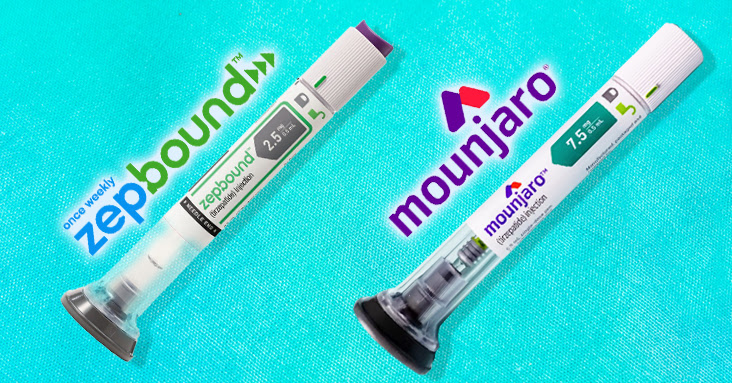Mounjaro vs Zepbound is a common question among those exploring GLP-1 medications for weight loss and diabetes management. While both contain the same active ingredient—tirzepatide—their FDA-approved uses and branding differ. In this article, we’ll break down everything you need to know.
If you’re exploring weight loss medications, you’ve likely come across two names: Mounjaro and Zepbound. At first glance, they may seem similar—both are made by Eli Lilly, both are injectable medications, and both are part of the new wave of GLP-1 receptor agonists that support weight loss. But are they actually the same medication? Let’s break it down.
💉 What Are Mounjaro and Zepbound?
-
Mounjaro (tirzepatide) was originally approved by the FDA in May 2022 for the treatment of type 2 diabetes.
-
Zepbound, also based on tirzepatide, was FDA-approved in November 2023 specifically for chronic weight management in adults with obesity or overweight with weight-related health conditions.
So yes, both contain tirzepatide, the same active ingredient. But they are approved for different purposes and have different branding to reflect that.
🔍 So, Are They the Same Medication?
✅ Chemically: Yes
Both Mounjaro and Zepbound use the exact same active compound — tirzepatide — and deliver it via similar pre-filled injection pens.
🚫 Legally & Label-wise: No
-
Mounjaro is marketed and prescribed for type 2 diabetes.
-
Zepbound is prescribed specifically for weight loss.
That distinction matters for insurance coverage, prescribing guidelines, and availability.
📦 Differences in Packaging & Dosage
While both use prefilled pens and weekly injections, Zepbound may offer different starting doses and titration schedules depending on the weight loss protocol, compared to Mounjaro’s diabetes-focused approach.
Also:
-
Zepbound pens are labeled and priced for weight management
-
Mounjaro pens are labeled for blood sugar control
💊 Why Does Eli Lilly Have Two Brands for the Same Drug?
This is a common strategy in pharmaceuticals called “indication-specific branding.”
-
Different branding helps separate the markets: Mounjaro for diabetes and Zepbound for obesity.
-
Insurance companies often treat them differently — weight loss medications are sometimes excluded, while diabetes drugs are more frequently covered.
-
It helps doctors prescribe more confidently based on approved use.
💰 Cost and Insurance Coverage
Because Zepbound is FDA-approved for weight loss, it may not be covered by all insurance plans—even though it contains the same medication as Mounjaro.
Some patients choose to ask their doctors to prescribe Mounjaro off-label for weight loss, but this is legally and ethically at the physician’s discretion and may not be allowed by some pharmacies.
💡 Tip: Eli Lilly sometimes offers savings cards or copay programs for both medications. Always check the latest offers.
🧪 Effectiveness for Weight Loss
Both drugs have shown impressive weight loss results:
-
Mounjaro patients in clinical trials lost up to 22.5% of their body weight (even though the trial was focused on diabetes).
-
Zepbound was studied specifically for weight loss and had similar, if not slightly better, outcomes depending on the dose.
Bottom line: Both are highly effective, but Zepbound is the version officially approved for weight loss.
❓ Common Questions
Can I switch from Mounjaro to Zepbound?
Yes — under medical supervision. Since they are chemically the same, your doctor may adjust your dose accordingly.
Is one cheaper than the other?
It depends on your insurance and location. Some find Mounjaro is more likely to be covered due to its diabetes indication.
Can I use Mounjaro for weight loss?
Some doctors prescribe Mounjaro “off-label” for weight loss, but this depends on your provider and local regulations.
✅ Conclusion on Mounjaro vs Zepbound
While Mounjaro and Zepbound both contain tirzepatide, they are not technically the same:
| Feature | Mounjaro | Zepbound |
|---|---|---|
| FDA Use | Type 2 Diabetes | Weight Loss |
| Active Drug | Tirzepatide | Tirzepatide |
| Branding | Diabetes-focused | Weight loss-focused |
| Insurance | More likely covered | May not be covered |
So, while chemically identical, they are branded, priced, and approved differently.
If you’re considering either option for weight loss, speak to a healthcare provider to determine which is best for your goals and coverage.






